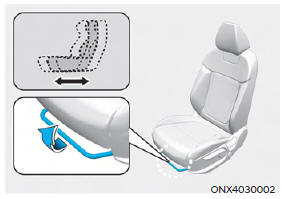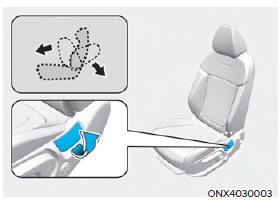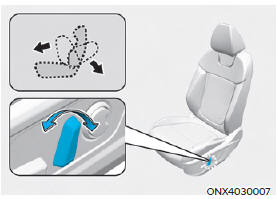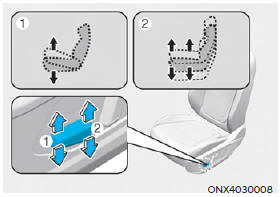Hyundai Tucson: Front seats
WARNING
Take the following precautions when adjusting your seat:
- NEVER attempt to adjust the seat while the vehicle is moving. The seat could respond with unexpected movement and may cause loss of vehicle control resulting in an accident.
- Do not place anything under the front seats. Loose objects in the driver's foot area could interfere with the operation of the foot pedals, causing an accident.
- Do not allow anything to interfere with the normal position and proper locking of the seatback.
- Do not place a cigarette lighter on the floor or seat. When you operate the seat, gas may exit out of the lighter causing a fire.
- Use extreme caution when picking up small objects trapped under the seats or between the seat and the center console. Your hands might be cut or injured by the sharp edges of the seat mechanism.
- If there are occupants in the rear seats, be careful while adjusting the front seat position.
- Make sure that the seat is locked in place after the adjustment. If not, the seat might move unexpectedly resulting in an accident.
CAUTION
To prevent injury:
- Do not adjust your seat while wearing your seat belt. Moving the seat cushion forward may cause strong pressure on your abdomen.
- Do not allow your hands or fingers to get caught in the seat mechanisms while the seat is moving.
Manual adjustment
The front seat can be adjusted by using the levers located underneath the seat cushion. Before driving, adjust the seat to the proper position so that you can easily control the steering wheel, foot pedals and controls on the instrument panel.

Forward and rearward adjustment
To move the seat forward or rearward:
- Pull up the seat slide adjustment lever and hold it.
- Slide the seat to the position you desire.
- Release the lever and make sure the
seat is locked in place. Move forward
and rearward without using the lever.
If the seat moves, it is not locked properly.
Seatback angle

To recline the seatback:
- Lean forward slightly and lift up the seatback lever.
- Carefully lean back on the seat and adjust the seatback to the position you desire.
- Release the knob and make sure the seatback is locked in place.
Reclining seatback
Sitting in a reclined position when the vehicle is in motion can be dangerous.
Even when buckled up, the protections of your restraint system (seat belts and/or air bags) is greatly reduced by reclining your seatback.
WARNING
NEVER ride with a reclined seatback when the vehicle is moving.
Riding with a reclined seatback increases your chance of serious or fatal injuries in the event of a collision or sudden stop.
Drivers and passengers should ALWAYS sit well back in their seats, properly belted, and with the seatbacks upright.
Seat belts must be snug against your hips and chest to work properly. When the seatback is reclined, the shoulder belt cannot do its job because it will not be snug against your chest. Instead, it will be in front of you. During an accident, you could be thrown into the seat belt, causing neck or other injuries.
The more the seatback is reclined, the greater chance the passenger's hips will slide under the lap belt or the passenger's neck will strike the shoulder belt.
Seat cushion height

To change the height of the seat cushion:
- Push down the lever several times, to lower the seat cushion.
- Pull up the lever several times, to raise the seat cushion.
Power adjustment (if equipped)
The front seat can be adjusted by using the control switches located on the outside of the seat cushion. Before driving, adjust the seat to the proper position so that you can easily control the steering wheel, foot pedals and controls on the instrument panel.
WARNING
NEVER allow children in the vehicle unattended. The power seats are operable when the vehicle is turned off.
NOTICE
To prevent damage to the seats:
- Always stop adjusting the seats when the seat has been adjusted as far forward or rearward as possible.
- Do not adjust the seats longer than necessary when the vehicle is turned off. This may result in unnecessary battery drain.
- Do not operate two or more seats at the same time. This may result in an electrical malfunction.
Forward and rearward adjustment

To move the seat forward or rearward:
- Push the control switch forward or rearward.
- Release the switch once the seat reaches the desired position.
Seatback angle

To recline the seatback:
- Push the control switch forward or rearward.
- Release the switch once the seatback reaches the desired position.
Reclining seatback
Sitting in a reclined position when the vehicle is in motion can be dangerous.
Even when buckled up, the protections of your restraint system (seat belts and air bags) is greatly reduced by reclining your seatback.
WARNING
NEVER ride with a reclined seatback when the vehicle is moving.
Riding with a reclined seatback increases your chance of serious or fatal injuries in the event of a collision or sudden stop.
Driver and passengers should ALWAYS sit well back in their seats, properly belted, and with the seatbacks upright.
Seat belts must be snug against your hips and chest to work properly. When the seatback is reclined, the shoulder belt cannot do its job because it will not be snug against your chest. Instead, it will be in front of you. During an accident, you could be thrown into the seat belt, causing neck or other injuries.
The more the seatback is reclined, the greater chance the passenger's hips will slide under the lap belt or the passenger's neck will strike the shoulder belt.
Seat cushion tilt (1)

To change the angle of the front part of the seat cushion: Push the front portion of the control switch up to raise or down to lower the front part of the seat cushion.
Release the switch once the seat reaches the desired position.
Seat cushion height (2)
To change the height of the seat cushion: Push the rear portion of the control switch up to raise or down to lower the height of the seat cushion.
Release the switch once the seat reaches the desired position.
Lumbar support (for driver's seat, if equipped)

To adjust the lumbar support:
- Press the front portion of the switch (1) to increase support or the rear portion of the switch (2) to decrease support.
- Release the switch once the lumbar support reaches the desired position.
Seatback pocket

The seatback pocket is provided on the back of the front seatbacks.
CAUTION
Do not put heavy or sharp objects in the seatback pockets. In an accident they could come loose from the pocket and injure occupants.
READ NEXT:
 Rear seats
Rear seats
Seatback angle
To recline the seatback:
Pull up the seatback recline lever.
Hold the lever and adjust the seatback
of the seat to the position you desire.
Release the lever and make sure the
seatback is locked in place. (The leve
 Seat warmers
Seat warmers
Seat warmers are provided to warm the
seats during cold weather.
During mild weather or under conditions
where the operation of the seat warmer
is not needed, keep the seat warmers
OFF.
WARNING
The seat warmers can cause a SERIOUS
BURN, eve
 Air ventilation seat
Air ventilation seat
The air ventilation seats are provided
to cool the front seats by blowing air
through small vent holes on the surface
of the seat cushions and seatbacks.
When the operation of the air ventilation
seat is not needed, keep the switches in
t
SEE MORE:
 Cylinder Head
Cylinder Head
Inspect for flatness.
Using a precision straight edge and feeler gauge, measure the contacting
surface of the cylinder block and the
manifolds for warpage
Flatness of cylinder head gasket surface:
Less than 0.05 mm (0.0020 in.) fo
 Refrigeration Cycle
Refrigeration Cycle
Engine Room
Compressor
Service port (Low pressure)
A/C pressure transducer (APT)
Service port (High pressure)
Suction & Liquid pipe assembly
Expansion valve cover
Interior
Auto defogging sensor
Photo sensor
PM s
Information
- Home
- Hyundai Tucson - Fourth generation (NX4) - (2020-2023) - Owner's Manual
- Hyundai Tucson - Fourth generation (NX4) - (2020-2023) - Workshop Manual